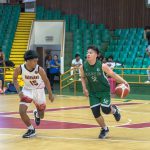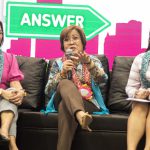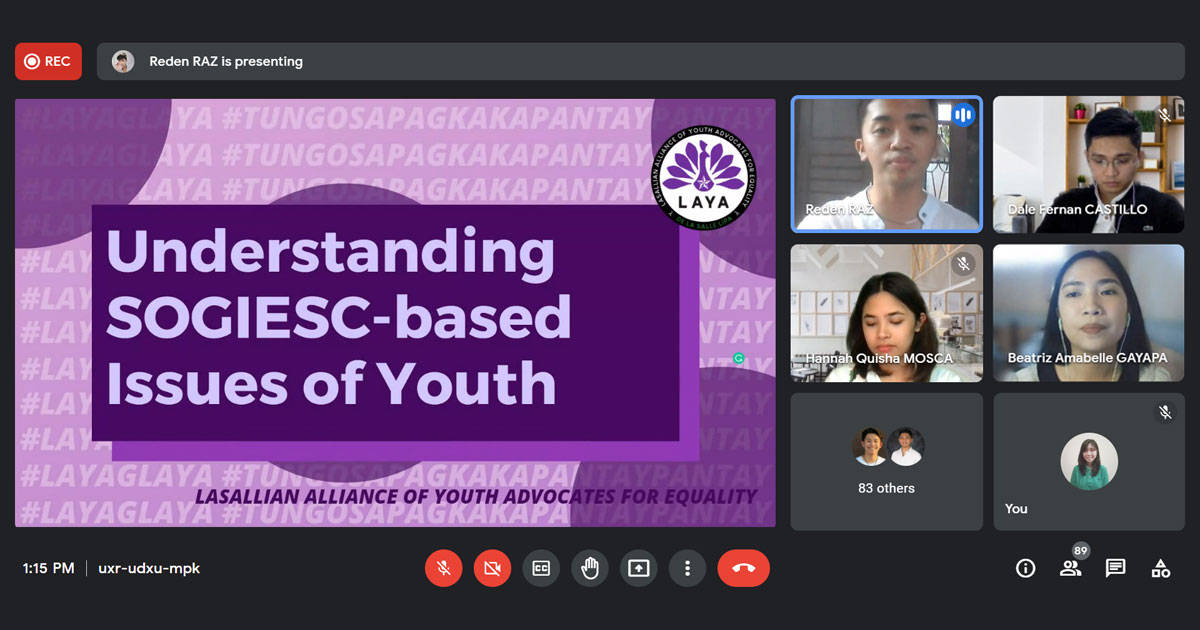
Dedicated to championing non-discriminatory and inclusive space for all, the De La Salle Lipa (DLSL) Student Government (SG) and Lasallian Alliance of Youth Advocates for Equality (LAYA) launched the first installment of their collaboration activity “How Can I Help?: Community Assembly” held via Google Meet, Nov. 24.
The consultative focus group discussion, which over 90 participants attended, sought to understand the Sexual Orientation Gender Identity and Expression and Sexual Characteristics- (SOGIESC) based concerns experienced by the youth and reassess the institutions’ current policies that are subject to redefining.
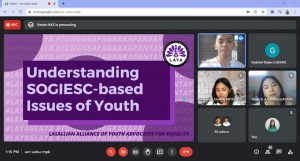
SOGIESC-based issues of youth
Reden Raz, LAYA executive president and founder, led the talk about defining SOGIESC and opened the discourse on the common SOGIESC-based concerns faced by the youth in a school setting.
They highlighted that people with diverse SOGIESC are susceptible to discriminating or stigmatizing remarks, sexualizing threats and abuse, deadnaming and misgendering, voyeurism, denying goods and services, accessing comfort rooms, and gender-insensitive contents in modules.
Raz narrated a specific experience of a student who had undergone discrimination in a classroom setup through his modules, which could develop a traumatic impression in a child’s mind, provoking fear of expressing oneself and feelings of exclusion.
“Sinabi sa module na isa siyang kasalanan na dapat magbago siya at kung ano-ano pa ang pinagsasabi doon na ini-invalidate ang lived experiences noong tao na ‘yon and imagine bata pa lang ‘yon,” said Raz.
In a separate interview, Arn Alinea, one of the event heads, also expressed that he has also been widely exposed to various discriminations and felt being in a space where he was not accepted.
“Kaya very important talaga sa akin na makapag-build ng space na welcome ang lahat. And, paano ba natin ito maa-achieve? Syempre, if the people around us are mindful and sensitive about my, or our struggles,” said Alinea.
Campus policy reorientation
In the second part of the discussion, Dale Fernan Castillo, SG executive president, reoriented the participants with the existing campus policies and expressed the need to modify specific guidelines to cultivate a better and safer space for the college community.
“Hindi po namin ito [campus policies] pinili para i-scrutinize o i-condemn, but we picked these to open a dialogue, to open a conversation for everyone,” said Castillo.
Castillo focused on the provisions under Section 3 (A.3) and Section 4 (C.1.4 and C.1.5), of which SG and LAYA solicited amendments.
Section 3 (A.3) encompasses concern to include gender identity and expression on discrimination, while Section 4 (C.1.4 and C.1.5) involves lifting the prohibition on crossdressing and wearing of make-up for males, and modifying long sporting hair, skinhead, or afro hair.
Moreover, Raz stated that these policies contribute to the social and educational development of the students and that the collaborative effort between the college community and the school is beneficial to enable everyone to live their expression and identity.
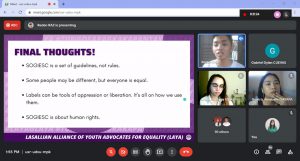
“Sana gamitin natin itong platform na ‘to [community assembly], not to use it against anyone but to use this for our progressive actions. Kasi itong ‘yung organizing aspect na mas magbibigay tayo ng kakayahan para sa bawat isa upang makilahok,” said Raz.
These policies are expected to be discussed in a conference between the SG and Discipline Office (DO) at the end of the semester, which could take effect on the online setup and future implementation of face-to-face classes.
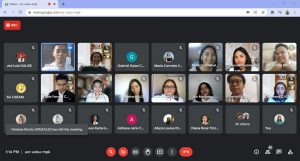
Activity feedback and recommendations
Before the end of the assembly, the organizers facilitated five breakout sessions to extend the dialogue and treat it as a safe space for the students to share their personal experiences about harassment, violence, inequality, and discrimination, and also to share their thoughts and suggestions regarding the proposed amendments of policies.
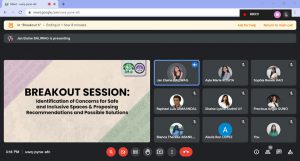
In one of the breakout sessions, Alexis Ron Lopez, a first-year accountancy student, suggested that it is essential to have also set appropriate punishments for violations that include racial and SOGIESC-based discrimination, if there is still no implemented policy for them.
“Hindi naman po sapat na removal of policies lang. Dapat po mayroong mga policies na nakalatag ‘yung student government natin pati ‘yung administration na magpo-proteka sa lahat ng tao, sa lahat ng estudyante—mapa-gay man, lesbian, or kahit anong gender identity,” said Lopez.
Moreover, Lopez affirmed that he felt safe and secure after attending the community assembly since organizers and other participants ensured an inclusive environment for all.
On the other hand, Kem Theresa Landicho, a first-year accountancy student, stated that she would be attending the next installment of activity as she has become eager to know more about the SOGIESC and the campus policies.
”Attending the said community dialogue made me more eager to know more about it. I was also happy because I was educated with those kinds of things [SOGIESC and campus policies], which made it easier for me to understand those kinds of situations,” said Landicho.
*
The How Can I Help is a three-part webinar dedicated to educating the Lasallian community on their roles in championing non-discriminatory and inclusive space for all and highlighting how collective individual and group efforts can support framing gender-responsive policies.
The second installment of the activity is yet to be announced by SG and LAYA.
Article by: Aldea Bernadette O. Monfero
with reports from Sunshine M. Antonio
